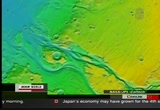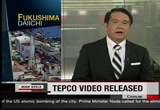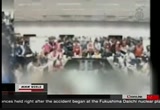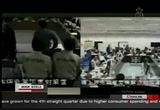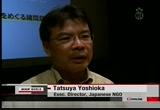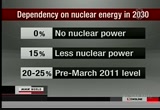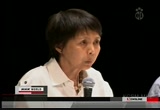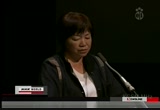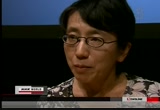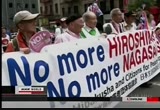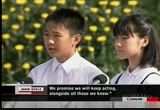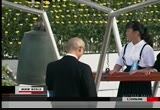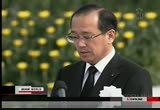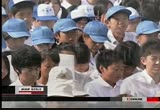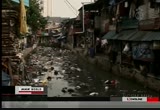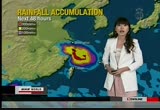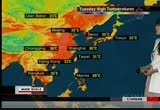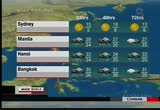tv Newsline 30min KCSMMHZ August 6, 2012 6:00am-6:30am PDT
6:00 am
touchdown confirmed. we're safe on mars! >> making it to mars. nasa scientists cheer as their space rover lands on the red planet to start exploring whether life once existed there. welcome to nhk world "newsline." the space probe called curiosity is now trying to live up to its name. it's exploring the surface of the planet trying to find evidence something, anything, once lived there. the rover landed earlier after a 36-week journey from earth. nasa scientists hope it will
6:01 am
help them answer questions about mars' past and about human kind's possible future there. nhk world's alex kirst reports from pasadena, california. >> reporter: nasa scientists spent years preparing for this moment and tense days tracking curiosity's approach to mars. then they heard the words they had been waiting for. >> touchdown confirmed! we're safe on mars. >> reporter: the cheering continued even as the six-wheeled spacecraft started beaming back its first images using one of its cameras. the black and white pictures showed the rover's shadow cast on the surface of mars. the u.s. space agency launched curiosity last november. it's the largest ever mars probe. the rover is about the size of a
6:02 am
small car and weighs nearly 1 ton. curiosity clocked 570 million kilometers on its journey to the red planet, but getting there was the easy part. the landing was the worry. nasa engineers billed the descent as seven minutes of terror. curiosity needed to slow down, almost to a stop from about 20,000 kilometers per hour. it deployed a parachute and used reverse thrust of its rocket engines to do that. now curiosity is exploring the planet. the surface temperature could be lower than minus 100 degrees celsius. the air is extremely thin. but scientists believe mars had much milder weather 4 billion years ago. they say the presence of clay
6:03 am
minerals suggests the planet once hosted warm, wet conditions. curiosity will search for signs life once existed there. this lab on wheels is packed with sophisticated instruments and is designed to carry out on-the-spot analysis of rocks and sand. the mars probe will score the planet's surface for two years. it will try to confirm theories that date back decades. but nasa scientists are also focused on the future. as one of them put it, the wheels of curiosity have begun to blaze the trail for human footprints to mars. alex kirst, nhk world, pasadena, california. tokyo electric power company executives have vowed to pressure and released some of the most important evidence from
6:04 am
the early days of the nuclear disaster. they unveiled videos that document the efforts to deal with the meltdowns and explosions at the fukushima daiichi plant. tepco officials show the recordings to the media monday. select journalists will now be able to watch 150 hours of edited tape from march 11th to 16th, 2011. it tracks the back and forth conversations between workers at the nuclear plant and personnel at headquarters. tepco also released 90 minutes of edited video. >> the video show workers trying to contain the accident after a series of hydrogen explosions in the early days of the disaster confused them. company executives were also
6:05 am
puzzled about the government's intervention in the crisis. tepco officials banned reporters from making their own recordings. they haven't said if they will release video from after march 16th. yori joins us and has been following this story. tell us about the significance of this video. >> tepco's conference is the only remaining record of communication between workers at the plant and employees at the company headquarters. the video begins at around 6:30 p.m. on march 11th. it goes on to record critical conversations that reflect how decisions were made and how the situation changed from time to time. >> now, the accident happened more than a year and a half ago. why did it take tepco officials so long to release this video? >> basically, they didn't want to release them.
6:06 am
they hadn't disclosed the videos even existed. we found out about the recordings in march through the course of our investigation into the accident by a diet-appointed panel. nhk and other media repeatedly made requests for access to the videos, but tepco officials had refused until now. they said the videos are internal records, and they cited concern about the privacy of their employees. they finally agreed to release recordings from the five days from march 11th. they edited the image to prevent individuals from being identified. >> how are people reacting to tepco's reluctance to release the videos related to the disaster? >> experts say all records should be under public control, even if access is limited. the head of the japanese ngo is calling for the abolition of nuclear plants. here's what he had to say.
6:07 am
>> this is the kind of very important historical document that -- i hope tepco themselves decide to open up more and more as far as transparency, and at the same time asked through the japanese government that you make pressure to them to release all of the information. >> tepco shareholders suing the companies executives filed a petition for the videos to be preserved as evidence. they fear that the utility may erase the record. proving to the cause of the accident is not finished, these videos will surely be needed for the investigation. the government should take action to preserve all records related to the accident, this incident in the public archive. >> thanks for that. yoishiro tateiwa. following the accident in fukushima, many people in japan have come to rethink the
6:08 am
country's dependence on nuclear power. the government proposed three options to reduce energy dependency from 0% to 15% and 20% to 25%. the japanese government held public hearings across the country to solicit views on the three options to decide future energy policy. nhk world's mitsuko nishikawa has this report. >> reporter: government officials heard from people in 11 locations across the country. and they often heard the same thing. 70% of participants are backing the zero percent option for japan's new energy policy. that means utilities would stop producing nuclear power by 2030. >> do you need the sort of energy that sacrifices the lives of people who work at the plant? >> translator: i hope that as much of our intelligence as possible can be used for the development of the best
6:09 am
technology for generating renewable natural energy. >> reporter: the accident at the fukushima daiichi nuclear plant was an eye-opener for many people in japan. the meltdowns, explosions and radiation leaks shook a long-held faith in atomic energy. tens of thousands of people still can't return to their homes near the facility. and crews are still trying to control the plant and prepare it for the multibillion-dollar decommissioning process. these public hearings are wrapping up, but people in japan are still looking to talk about the future of nuclear energy. civic groups have been organizing open debates. >> persolly, i want japan to use as little nuclear power as possible. >> translator: there should be various points of discussion, but we feel the government has
6:10 am
been failing to provide appropriate information. distrust of its activities is growing. >> reporter: skepticism is growing, too. people wonder how the government will reflect public opinion and the new energy policy. one official admits it will be challenging. >> translator: it's difficult to see which kind of opinion is more important. opinions expressed at the hearings or results of opinion polls. >> reporter: the organizer of this debate says citizens want the entire process to be open and understandable. >> some people are criticizing this process as making just excuse. they have to explain to the people how they pick up this scenario. and how they can address
6:11 am
people's concerns. i think in a sense, transparency is the key. >> reporter: the japanese government planned to decide on the energy policy by the end of this month, but would support going for the zero percent nuclear power option. it is considering postponing that deadline. mitsuko nishikawa, nhk world, tokyo. a final note on this story, prime minister yoshihiko noda reacted monday to the results of the public hearings. he said he will instruct his ministers toind out what challenges lie ahead some japan choose the zero percent option and go nuclear-free by 2030. hiroshima, nagasaki. the atomic bombings marked a brutal conclusion to a brutal conflict. world war ii ended 67 years ago this month.
6:12 am
"newsline" is looking back on the lessons of 1945, from the fight to abolish nuclear weapons and younger generations to support peace. our special coverage, "war to peace: lessons of 1945" continues until friday, august 17th. august 6th is a day people in hiroshima will never forget. in 1945, the u.s. bomber dropped an atomic bomb on their city. people stopped again on the 67th anniversary to remember. the mayor recounted the stories of survivors and reminded people about the dangers of nuclear power. nhk world's kekichi hanada reports from hiroshima. >> reporter: the sound of cicadas is for many the sound of remembrance. people from hiroshima and around the world gathered to reflect the events for which the city is known.
6:13 am
>> reporter: about 50,000 people attended the hiroshima peace memorial ceremony. they came to remember the day in 1945 an atomic bomb destroyed this city. the explosion killed tens of thousands of people in an instant. its after effects left 140,000 dead by the end of that year. the mayor of hiroshima placed a list of the victims in the cenitaph. it contained the names of the 5,729 people who died over the past or are now known to have perished as a result of the bombing. lists in the vault include 280,000 names. the bomb was dropped at 8:15 in the morning. people here start every year at that time to mark the moment everything changed.
6:14 am
[ bells ] >> reporter: dignitaries from more than 70 countries attended the ceremony. among them the ambassadors of three countries that possess nuclear weapons. the british and french ambassadors to japan attended for the first time. u.s. ambassador john roos for the second time. the mayor delivered the annual peace declaration on behalf of survivors. many of them share their stories in an effort to abolish nuclear weapons. >> translator: i firmly believe that the demand from freedom from nuclear weapons will spread out from hiroshima and circle the globe and lead us to genuine world peace. >> reporter: matsui asked the japanese government to reconsider nuclear power after the crisis at fukushima daiichi.
6:15 am
>> translator: i call on the japanese government to stop -- establish without delay an energy policy that guards the safety and security of its people. >> reporter: operators shut down plants one by one after the accident leaving the country without nuclear power heading into summer. last month prime minister yoshihiko noda decided to retart the plant in central japan. he told the crowd the country would reduce its dependence on nuclear energy in the long term. and he said people across japan bear the responsibility of sharing the story of hiroshima. >> translator: the government for its part will continue to appeal for the importance of a world without nuclear weapons. and it will continue to support in many ways the activities to hand down the memories of survivors across national borders and generations. >> reporter: survivors are dying one by one and many stories are dying with them. but now young people are
6:16 am
training to learn those stories to remind others about what happened here. keikichi hanada, nhk world, hiroshima. japan's economic engine is stalling. a key indicator fell in june for the third straight month, partly due to a drop in car exports. the cabinet office said on monday that the coincidence index that tracks the current state of the economy fell 2 points from may to 93.8. the index reflects economic activities like industrial production and employment. production of cars for export and auto parts for the domestic market declined in june. the cabinet office downgraded its assessment from improving to weakening. it's the first downgrade in 15 months. officials say they will continue to monitor developments in domestic auto sales that have been supported by government subsidies for eco-car buyers and added they will keep a close watch on overseas economies, including the united states and china.
6:17 am
cash strapped japanese electronics giant sharp may not be getting the kind of financial support it hoped for from his business partner in taiwan for turning itself around. there was a recent steep decline in its stock price. back in march, honhai agreed to buy a stake in sharp as the japanese-maker continued to lose money in its tv and lcd panel businesses. originally honhai was to pay 550 yen or about $7 for each sharp share but the japanese-maker's stock has fallen to less than one-third of that price. the two companies will review the terms of their agreement and are likely to discuss lowering honhai's share purchase price. that would force sharp to revise its plans to strengthen its financial base as a lower price means less money from honhai. the two companies will continue with their plan to jointly operate an lcd panel factory in
6:18 am
japan. nearly 240 million people across indonesia wage a constant battle with infectious diseases transmitted by mosquitoes. two overseas firms are offering weapons providing relief and proving a boost for business. tanizawa reports. >> reporter: they are tiny, but mosquitoes like this cause major headaches for the people of indonesia. they spread potentially life threatening illnesses, including malaria and dengue fever. tens of thousands of people are infected every year. indonesia's economy is expanding
6:19 am
about 6% a year, but even in the center of the capital jakarta. people still live in unsanitary conditions. this raises the risk of disease. >> translator: look, we have many mosquitoes. three of my neighbors recently became seriously ill with dengue fever. >> reporter: now there is household appliance that can help. this air conditioner is actually designed to kill mosquitoes. it's called the terminator. south korean electronics firm lg developed it specifically for indonesia. the terminator has a special function. it zaps mosquitoes with ultrasonic waves that can be heard by the human ear. >> translator: indonesia is a tropical country that people suffer from mosquito attacks.
6:20 am
that's why we invented our own technology to kill them. >> reporter: tropical indonesia is warm and steamy throughout the year. this creates a perfect environment for mosquitoes. a japanese insecticidemaker is currently enjoying rapid sales growth, but coming up with just the right product for the indonesian market took time and effort. this laboratory has many mosquitoes collected from indonesia. they are used to produce special coils to drive away powerful indonesia mosquitoes. researchers discovered something amazing. indonesia's mosquitoes are five
6:21 am
times more resistant to insecticides than those found in japan. they use data from this laboratory to adjust the ingredients in the mosquito coils. they developed new ones that are effective, even against indonesia's mosquitoes. but product enhancements alone are not enough to capture indonesia's huge market. the sales strategist adopted a bottom-up approach to get the word out to shoppers about its product. it has about 50 sales teams whose job is to visit every bridge on indonesia's most visited island. >> reporter: the teams target small local shops that most
6:22 am
indonesians use for daily necessities. they try to persuade the shop owners to sell the mosquito coils. there are an estimated 1.5 million shops there. the goal is to make contact with every single one. >> translator: sales have grown more than six times in this area since we started this so it's working very well. indonesia is a tropical country with a huge population. we see it as the world's biggest market for mosquito coils. >> reporter: there's no end in sight to indonesia's war on mosquitoes, but its big market and growing economy will keep companies coming up with new ways to defeat the blood-sucking insects. soichiro tanizawa, nhk world.
6:23 am
for an update on the weather, here's mai shoji. >> it is typhoon season. over the waters of this eastern continental asia, we have haikui which is now moving towards where no more rain is really welco welcomed. and this is going to be affecting much of the areas that already has seen flooding conditions, which are not alleviated yet. more than a million people have been dislocated due to the ex-if i foon th-- typhoon that has ba this area. saola has left such devastation and has not completely improved but a very brief break until this storm heads toward the similar regions in and around shanghai, we'll alsoing seeing accumulation benefit 250 millimeters. exceeding about 300 millimeters in some localized areas and we're talking about jejung
6:24 am
profferinces and fujian province. and northwestern taiwan as well. so lot ofs going to be accumulating with this storm system. it looks like it's going to be making landfall in the next 48 hours. also okinawa has seen plenty of rain due to this outer band from this storm system about 300 millimeters of accumulation has been reported and also gusty conditions as well. storm surges, high waves of up to about 6 meters high. these are all going to be at very high risk. coastal flooding will also be just up the risk as well. also, across much of the rest of the country, we saw staggering amounts of short time heavy rain in metropolitan tokyo as well. in tohoku region, already has season 86.5 millimeters just in the span of one hour. and this unstable weather condition is going to be continuing until early morning
6:25 am
tomorrow. the philippines will also be seeing ongoing heavy rain. especially in the western. in the 30s in the midtropics and 33 here in tokyo. we'll be starting to see some sunshine afternoon hours. all right. moving over to the americas, we are seeing this storm system. this is ernesto which is heading towards the yucatan peninsula. especially possibly making landfall in and around belize in the next 48 hours. accumulating hefty amounts of rainfall here as well and then moving over a land mass, moving towards the gulf of mexico. perhaps also in jamaica we found 100 millimeters in the past 24 hours, but additional of the similar amounts will be found here as well. coastal flooding is going to be just very high. also storm surges and high waves to be aware of. temperaturewise, here across the canada and americas regions, oklahoma city down to 30. still very hot, though, and
6:26 am
phoenix reaching up to 44. excessive heat warnings are posted up here. moving over to the european continent, the developing low pressure system is going to be affecting much of the scandinavian peninsula with some stormy conditions. and then the cold front, this is a strong one. that will be just sagging and sweeping across poland and the baltic states. and the gusts could reach as much as 80 kilometers per hour. very heavy rain could be found across central portions of europe as well. temperaturewise, soaring into the 40s here in bucharest so heat dome is persisting across the balkans and also in italy. across london where we'll be seeing cloudy skies in general but some sunny spells on your thursday as well and temperatures not bad at all. now here's your extended forecast.
201 Views
IN COLLECTIONS
KCSMMHZ Television Archive
Television Archive  Television Archive News Search Service
Television Archive News Search Service 
Uploaded by TV Archive on

 Live Music Archive
Live Music Archive Librivox Free Audio
Librivox Free Audio Metropolitan Museum
Metropolitan Museum Cleveland Museum of Art
Cleveland Museum of Art Internet Arcade
Internet Arcade Console Living Room
Console Living Room Books to Borrow
Books to Borrow Open Library
Open Library TV News
TV News Understanding 9/11
Understanding 9/11


